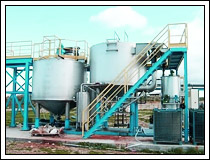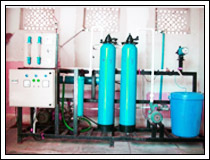Industrial Waste Water Treatment
Over the years, along with the rapid rate of industrialization and our lack of conscious efforts, water pollution has also increased. With the ever increasing rise in  pollution levels in today's world and huge water bodies becoming sewage dumps with each passing day, there is an urgent need for sophisticated means of water treatment techniques through which the contaminated water can be purified and treated of its sludge & waste and safely returned to the environment or even better recycled. pollution levels in today's world and huge water bodies becoming sewage dumps with each passing day, there is an urgent need for sophisticated means of water treatment techniques through which the contaminated water can be purified and treated of its sludge & waste and safely returned to the environment or even better recycled.
The main sources of Industrial wastewater can be mainly credited to the following sectors:
- Agricultural Industries
- Iron and Steel Industries
- Mines and Quarries
- Food Industries
- Complex Organic Chemical Industries
- Nuclear Industries.
Industrial wastewater treatment has become a huge subject all to itself in modern days, covering the entire mechanisms and processes used to treat waters that have been contaminated in some way by anthropogenic industrial or commercial activities. Governments across the globe has introduced mandatory measures to mineralize and recycle wet wastes, but then they have their own limitations too.
Technologies Employed
A few noteworthy technologies employed to treat wastewater are listed below:
Physical-Chemical Treatment Systems
Physical-Chemical treatment is actually the generic term used for Coagulation-Flocculation. Clarification is the measure taken in this conventional method of waste and surface water treatment. This technology consists of removing all kind of particles, sediments, oil, natural organic matter and colour from the water by screening, flotation and filtration to make it clear. For industrial effluents, centrifugation is applied for heavy particles removal.
Anaerobic/Aerobic Treatment
This is basically a biologically developed wastewater treatment treatment technology used to lower the organic load of soluted organic compounds. In aerobic systems, the water is aerated with compressed air to provide ding oxygen to the effluent to be treated.
Sludge Treatment

The sludges accumulated in a wastewater treatment process must be treated and disposed off in a safe and effective manner. It is generally done by employing processes like Stabilization, Composting, De-watering, Sludge Drying and Anaerobic Digestion.
Membrane Filtration
Membrane filtration refers to activated sludge treatment with a membrane liquid-solid separation process. The membrane component uses low pressure microfiltration or ultra filtration membranes and eliminates the need for clarification and tertiary filtration.
Advanced Oxidation Systems
These processes mainly concentrate on reducing COD/BOD levels and removing both organic and oxidisable inorganic components in water by employing chemical oxidants. The processes completely oxidize organic materials to carbon dioxide and water, although it is often not necessary to operate the processes to this level of treatment.
Biological Excess Sludge Reduction
These gentle biological processes that support activated sludge processes are available commercially. Their application causes quick and durable saving of costs by stimulating the metabolism of the microorganisms acting in the activated sludge tank. This encourages the development of a healthy, efficient biomass and leads to a significant improvement and acceleration of activated sludge processes.
 |
Sources of Industrial Water Waste
The agricultural sector produces an enormous volume of wastewater every year. The two main sources of wastewater in agriculture are: a) non-point source pollution and b) point source pollution.
|
|
|
|